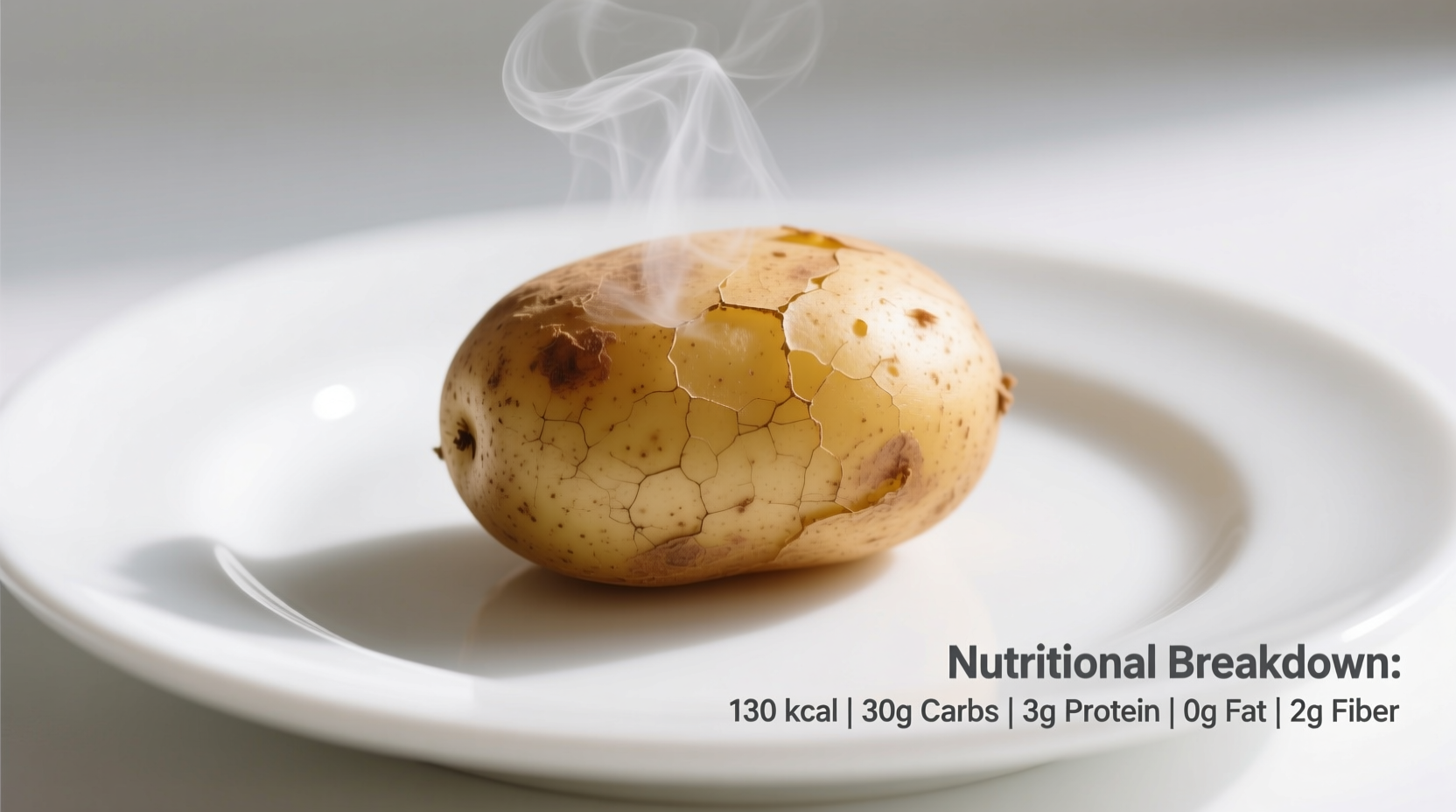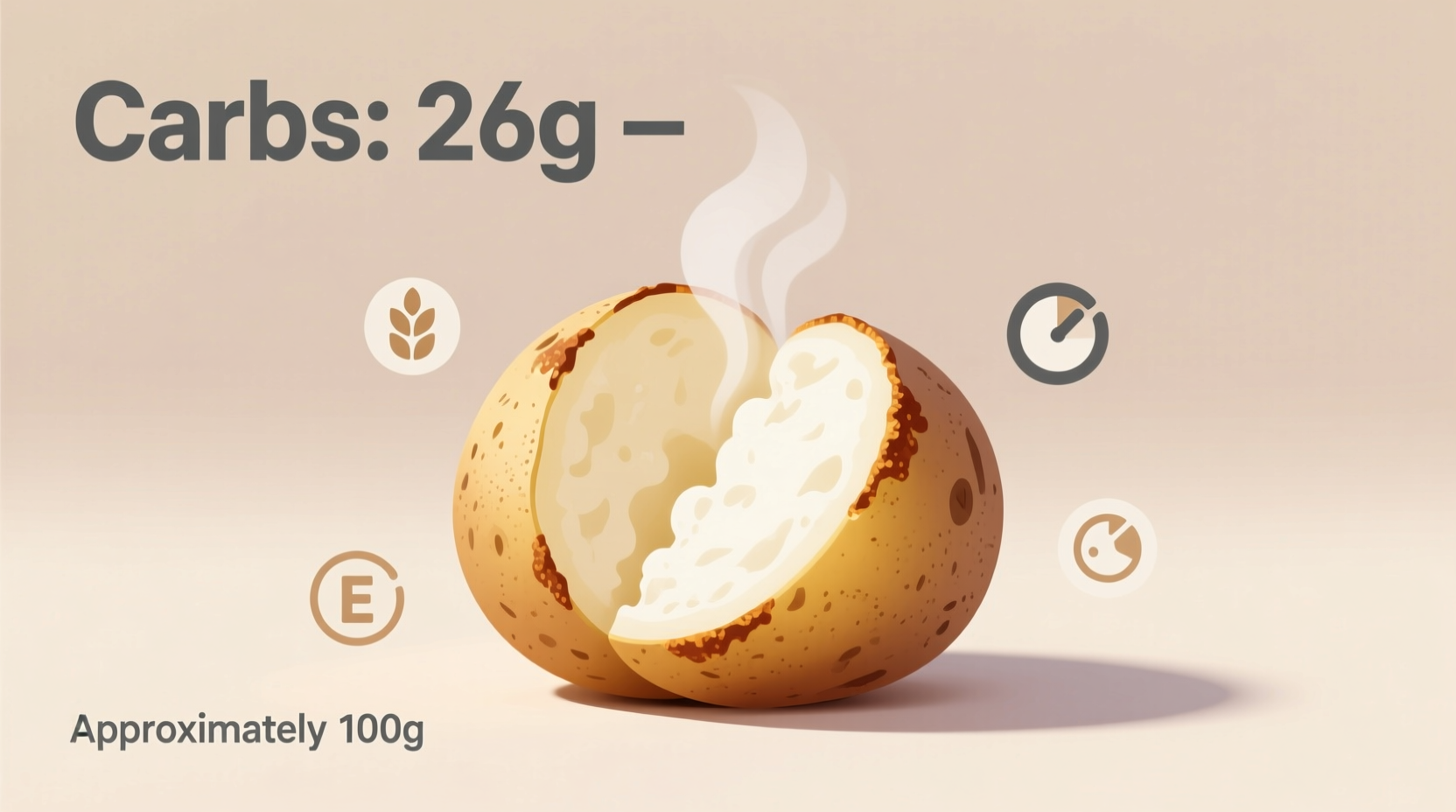Understanding Carbohydrates in Your Small Baked Potato
When planning meals or tracking your nutrition, knowing the exact carbohydrate content of common foods like potatoes is essential. This comprehensive guide breaks down everything you need to know about the carbs in a small baked potato, backed by authoritative nutritional data and practical usage information.
What Exactly Are You Eating? Potato Carb Composition
A small baked potato (138g with skin) delivers 26g total carbohydrates, but not all carbs are created equal. According to the USDA FoodData Central database, the carbohydrate profile breaks down as follows:
| Carbohydrate Type | Amount per Small Baked Potato | Percentage of Total Carbs |
|---|---|---|
| Total Carbohydrates | 26g | 100% |
| Dietary Fiber | 2.1g | 8.1% |
| Sugars | 0.7g | 2.7% |
| Starch | 23.2g | 89.2% |
The majority of carbohydrates in potatoes come from starch, a complex carbohydrate that provides sustained energy. Unlike refined starches, potato starch comes packaged with valuable nutrients including potassium, vitamin C, and fiber.

How Potato Carbs Fit Into Your Daily Nutrition Goals
Understanding how these carbohydrates translate to your daily needs is crucial for effective meal planning. For most adults following a standard 2,000-calorie diet:
- 26g of carbs represents approximately 9% of the recommended daily carbohydrate intake (225-325g)
- The 2.1g of dietary fiber contributes about 7% toward the recommended daily fiber intake (25g for women, 38g for men)
- Potatoes have a medium glycemic index (54-73 depending on preparation), meaning they cause a moderate rise in blood sugar compared to high-GI foods
Research from the American Journal of Clinical Nutrition shows that consuming potatoes with their skin significantly increases fiber content and slows carbohydrate absorption, making them a more blood-sugar-friendly option than peeled potatoes.
Practical Portion Guidance for Different Dietary Needs
Whether you're managing diabetes, pursuing weight loss, or fueling athletic performance, understanding appropriate potato portions is key:
For General Health Maintenance
A small baked potato (5.3" long) fits comfortably within standard meal plans. Pair it with lean protein and non-starchy vegetables for a balanced plate where carbohydrates comprise about 1/4 of your total plate.
For Diabetes Management
The American Diabetes Association recommends that people with diabetes can include potatoes in their meal plans when portion-controlled. A small baked potato contains approximately 1.5 carbohydrate servings (15g carbs per serving). Monitoring blood glucose responses to potato consumption can help determine individual tolerance.
For Active Individuals and Athletes
Potatoes provide excellent carbohydrate fuel before or after workouts. The complex carbohydrates deliver sustained energy, while the potassium content helps maintain proper muscle function. Many sports nutritionists recommend consuming a small baked potato 2-3 hours before endurance activities for optimal energy availability.
How Cooking Method Affects Carb Content
While the total carbohydrate content remains relatively stable regardless of cooking method, how you prepare your potato affects its nutritional impact:
- Baking with skin: Preserves maximum nutrients and fiber (26g total carbs)
- Boiling with skin: May cause slight nutrient leaching into water (25g total carbs)
- Microwaving: Minimal nutrient loss (26g total carbs)
- Frying: Adds significant fat but doesn't change carb content (still 26g)
Interestingly, cooling cooked potatoes increases their resistant starch content by up to 50%, according to research published in the Journal of Nutrition and Metabolism. This resistant starch functions more like fiber in the body, reducing the net carbohydrate impact and providing additional gut health benefits.
Smart Pairing Strategies to Balance Potato Carbs
You can significantly modify the glycemic impact of potatoes through strategic food combinations:
- Add healthy fats like olive oil or avocado to slow carbohydrate absorption
- Include protein sources such as grilled chicken or fish to create a more balanced meal
- Pair with vinegar-based dressings, which research shows can lower the glycemic response
- Combine with non-starchy vegetables to increase fiber content without adding significant carbs
A study from the European Journal of Clinical Nutrition demonstrated that adding 2 tablespoons of vinegar to a meal containing potatoes reduced the post-meal blood glucose spike by approximately 30% compared to the same meal without vinegar.
Common Misconceptions About Potato Carbohydrates
Despite their nutritional value, potatoes often face unnecessary criticism in low-carb diet circles. Let's address some common misconceptions:
- "Potatoes are just empty carbs" - False. Potatoes provide significant potassium (more than bananas), vitamin C, and B vitamins along with their carbohydrates.
- "All carbs in potatoes turn to sugar immediately" - Misleading. While potatoes do raise blood sugar, their medium glycemic index means this happens gradually, especially when eaten with skin and paired with other foods.
- "Sweet potatoes are always better than white potatoes" - Not necessarily. Both have nutritional advantages; white potatoes provide more potassium while sweet potatoes offer more vitamin A.
Tracking Carbs in Your Baked Potato: Practical Tips
For accurate carb counting, follow these practical guidelines:
- Weigh potatoes before cooking for most accurate measurement (water content changes during cooking)
- Use standard sizing references: a small potato is approximately 5.3" long and 1.9" in diameter
- Remember that toppings significantly affect total carb content (sour cream: 1g/oz, butter: 0g, chives: 0.5g/tbsp)
- When dining out, restaurant "small" potatoes may actually be medium or large (typically 170-200g)
How Potatoes Compare to Other Common Carb Sources
Understanding how potatoes stack up against other carbohydrate sources helps with informed meal planning:
| Food (per 100g) | Total Carbs | Fiber | Glycemic Index |
|---|---|---|---|
| White rice (cooked) | 28g | 0.4g | 73 |
| Whole wheat bread | 41g | 7g | 69 |
| Quinoa (cooked) | 21g | 2.8g | 53 |
| Small baked potato | 18.8g* | 1.5g* | 54-73 |
*Calculated per 100g based on 138g small potato with 26g total carbs
As you can see, potatoes actually contain fewer carbohydrates per 100g than white rice and provide more fiber than refined grains. Their glycemic index falls in the medium range, making them a reasonable carbohydrate choice when portion-controlled and properly prepared.
Special Considerations for Specific Dietary Approaches
Different dietary approaches treat potato carbohydrates differently:
Ketogenic Diets
Most ketogenic diets restrict carbohydrates to 20-50g daily, making even a small baked potato (26g carbs) problematic for strict keto adherence. Some modified keto approaches might include small portions of potatoes occasionally.
Low-Carb Diets
For moderate low-carb diets (50-130g carbs daily), a small baked potato can fit within daily limits when balanced with other lower-carb foods throughout the day.
Mediterranean Diet
Potatoes are traditionally included in Mediterranean eating patterns, typically prepared with olive oil and herbs. The focus is on moderate portions and healthy preparation methods.
Maximizing Nutritional Value: Potato Preparation Tips
Follow these chef-tested techniques to get the most nutritional value from your potatoes:
- Always bake with skin on - The skin contains nearly half the fiber and significant nutrients
- Cook then cool - Cooling cooked potatoes increases resistant starch content by up to 50%
- Avoid overcooking - Extended cooking times can degrade some heat-sensitive nutrients
- Pair with vitamin C-rich foods - Enhances iron absorption from the potato
- Use healthy fats - Olive oil or avocado oil improves absorption of fat-soluble nutrients
Professional chefs like those at the Culinary Institute of America recommend these preparation methods to maximize both flavor and nutritional benefits while maintaining appropriate carbohydrate levels for balanced eating.
When to Choose Potatoes Over Other Carb Sources
Potatoes offer unique nutritional advantages in certain situations:
- When you need quick energy replenishment after intense exercise
- When managing potassium deficiency (one small potato provides 17% of daily potassium needs)
- When seeking affordable, shelf-stable carbohydrate sources
- When looking for naturally gluten-free carbohydrate options
- When needing a versatile base for nutrient-dense toppings
According to dietary pattern research from the Harvard T.H. Chan School of Public Health, potatoes can be part of healthy eating patterns when consumed in appropriate portions and prepared using healthy methods.











 浙公网安备
33010002000092号
浙公网安备
33010002000092号 浙B2-20120091-4
浙B2-20120091-4